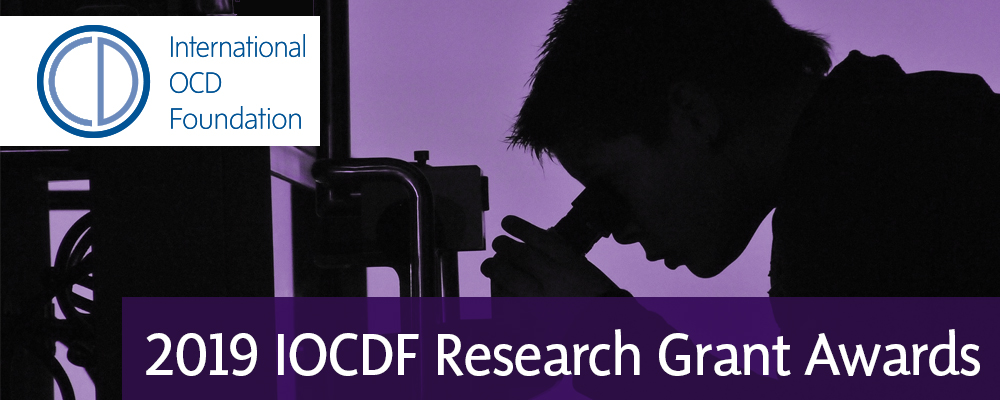December 2018 Edition
Spotlight is our monthly email series that gives our readers regular updates on OCD and related disorders research and news. Enjoy reading the December edition here on our blog, and if you would like to get the next update in your inbox, please click here!
Making Headlines
A roundup of recent stories from journalists, advocates, and researchers across the web.
by Wajahat Ali
New York Times
Author, playwright, and lawyer Wajahat Ali explores life with OCD in a recent opinion piece for the New York Times. Ali's is an excellent but brief overview that features quotes from author David Adam, and OCD specialist Dr. Steven Phillipson.

by Zoe Whittall
Refinery29
The only thing worse than the fear and frustration of battling the intrusive thoughts and anxiety of OCD was the time she lost to them. Despite seeking help and advice from professionals ranging from a GP to a college professor, it took writer and novelist Zoe Whittall years of suffering, lost jobs, and missed opportunities to find a specialist who finally recognized her symptoms. Through sharing her story, Whittall hopes to increase awareness so others might not lose a decade of their lives.
IOCDF.org Blog
Community Highlights Series
Robin Roblee-Strauss is a student filmmaker at Hampshire College in Massachusetts. Robin's own struggles have inspired him to focus his thesis work on the stories and experiences of people living with OCD. In this interview, he describes his past work, his own personal journey, and invites those interested in participating in this project to contact him.

The IOCDF is now accepting applications for the 2019 Research Grant Awards!
Each year, the IOCDF awards grants to research scientists pursuing projects in the field of OCD and related disorders. This year we will award as many as eight research grants through our Young Investigator, Breakthrough, and Innovator Awards programs. Applications are due February 28th, 2019.
To learn more about these grants, and for information about how to apply, please visit our website.
Research Corner
A monthly roundup of the latest OCD research from scientific journals. Articles that require a journal subscription or purchase to view their full text are denoted with "($)". All linked articles provide a brief, publicly-accessible summary of research and findings.
By Ana Pérez-Vigil, Ellenor Mittendorfer-Rutz, Magnus Helgesson, Lorena Fernández de la Cruz, and David Mataix-Cols
There is evidence that OCD is amo ng the leading causes of disability in developed countries, and for people with OCD, the disorder’s capacity to impact them at work can be painfully clear. Recently-published research funded by the IOCDF is shedding new light on the true impact that OCD can have on a person’s ability to participate in the labor force and maintain steady employment. Dr. Lorena Fernández de la Cruz, a researcher at the Karolinska Institutet in Sweden, lead a project that examined millions of anonymous health and employment records collected in a Swedish national register. She finds that people with OCD are about 75% more likely than healthy individuals to experience long-term unemployment, and 3 times more likely to utilize long-term sick leave.
ng the leading causes of disability in developed countries, and for people with OCD, the disorder’s capacity to impact them at work can be painfully clear. Recently-published research funded by the IOCDF is shedding new light on the true impact that OCD can have on a person’s ability to participate in the labor force and maintain steady employment. Dr. Lorena Fernández de la Cruz, a researcher at the Karolinska Institutet in Sweden, lead a project that examined millions of anonymous health and employment records collected in a Swedish national register. She finds that people with OCD are about 75% more likely than healthy individuals to experience long-term unemployment, and 3 times more likely to utilize long-term sick leave.
 ng the leading causes of disability in developed countries, and for people with OCD, the disorder’s capacity to impact them at work can be painfully clear. Recently-published research funded by the IOCDF is shedding new light on the true impact that OCD can have on a person’s ability to participate in the labor force and maintain steady employment. Dr. Lorena Fernández de la Cruz, a researcher at the Karolinska Institutet in Sweden, lead a project that examined millions of anonymous health and employment records collected in a Swedish national register. She finds that people with OCD are about 75% more likely than healthy individuals to experience long-term unemployment, and 3 times more likely to utilize long-term sick leave.
ng the leading causes of disability in developed countries, and for people with OCD, the disorder’s capacity to impact them at work can be painfully clear. Recently-published research funded by the IOCDF is shedding new light on the true impact that OCD can have on a person’s ability to participate in the labor force and maintain steady employment. Dr. Lorena Fernández de la Cruz, a researcher at the Karolinska Institutet in Sweden, lead a project that examined millions of anonymous health and employment records collected in a Swedish national register. She finds that people with OCD are about 75% more likely than healthy individuals to experience long-term unemployment, and 3 times more likely to utilize long-term sick leave.by Patricia Velloso, Cinthia Piccinato, Ygor Ferrão, Eduardo Aliende Perina, Raony Cesar, Leonardo F. Fontenelle, Ana G. Hounie, and Maria Conceição do Rosário
In one of the largest samples of adult OCD patients, Brazilian researchers explored the effects of the disorder on quality of life. As a group, the 575 sampled patients reported significantly lower quality of life scores than the general population across all dimensions, save physical functioning. The most affected aspects were mental health, vitality, and emotional role. Ratings of quality of life did not differ according to age of onset or treatment, but illness duration, severity, chronicity, and the presence of co-morbid disorders did significantly lower quality of life ratings. After treatment, quality of life ratings improved across all dimensions, although not to the same levels as the general population. Author Dr. Maria Conceição do Rosário is a past recipient of a research grant award from the IOCDF (2001).
Research Highlight: Pediatric OCD and Related Disorders
For many people, OCD symptoms begin in childhood, but may not be recognized for a variety of reasons. This series features a roundup of the newest research findings and news stories about OCD in children and adolescents on a quarterly basis. To learn more about pediatric OCD, please visit our OCDinKids.org website.
by Davíö R.M.A. Højgaard, Katja A. Hybel, Erik Lykke Mortensen, Tord Ivarsson, Judith Becker Nissen, Bernhard Weidle, Karin Melin, Nor Christian Torp, Kitty Dahl, Robert Valderhaug, Gudmundur Skarphedinsson, Eric A. Storch, & Per Hove Thomsen
In a soon-to-be released article,  researchers found that the type of symptoms children and adolescents with OCD present with may affect the success of treatment. Dr. Davíö Højgaard and team assessed 269 participants with pediatric OCD and found three main classes emerge: symmetry/hoarding, harm/sexual, and contamination/cleaning. The group that reported symptoms related to symmetry and hoarding were most likely to respond to CBT. Co-author Dr. Eric Storch is a member of the IOCDF Scientific and Clinical Advisory Board.
researchers found that the type of symptoms children and adolescents with OCD present with may affect the success of treatment. Dr. Davíö Højgaard and team assessed 269 participants with pediatric OCD and found three main classes emerge: symmetry/hoarding, harm/sexual, and contamination/cleaning. The group that reported symptoms related to symmetry and hoarding were most likely to respond to CBT. Co-author Dr. Eric Storch is a member of the IOCDF Scientific and Clinical Advisory Board.
 researchers found that the type of symptoms children and adolescents with OCD present with may affect the success of treatment. Dr. Davíö Højgaard and team assessed 269 participants with pediatric OCD and found three main classes emerge: symmetry/hoarding, harm/sexual, and contamination/cleaning. The group that reported symptoms related to symmetry and hoarding were most likely to respond to CBT. Co-author Dr. Eric Storch is a member of the IOCDF Scientific and Clinical Advisory Board.
researchers found that the type of symptoms children and adolescents with OCD present with may affect the success of treatment. Dr. Davíö Højgaard and team assessed 269 participants with pediatric OCD and found three main classes emerge: symmetry/hoarding, harm/sexual, and contamination/cleaning. The group that reported symptoms related to symmetry and hoarding were most likely to respond to CBT. Co-author Dr. Eric Storch is a member of the IOCDF Scientific and Clinical Advisory Board.Sleep-Related Problems in Pediatric Obsessive-Compulsive Disorder and Intensive Exposure Therapy ($)
by Natalja A. Nabinger de Diaz, Lara J. Farrell, Allison M. Waters, Caroline Donovan, & Harry W. McConnell
Eighty-four percent of youth with OCD are affected by sleep-related problems, according to a recently-published study. Researchers note a correlation between sleep-related issues and functional impairment as well as internalizing symptoms. Younger patients were also more likely to be affected than older adolescents. There was no noted connection between sleep issues and symptom severity or treatment effectiveness, though.
Find other research-related resources from the IOCDF, including:
- Join a research study as a participant
- Learn about the IOCDF Research Grant Program
- Recruit participants for an IRB-approved research study




Leave a Reply